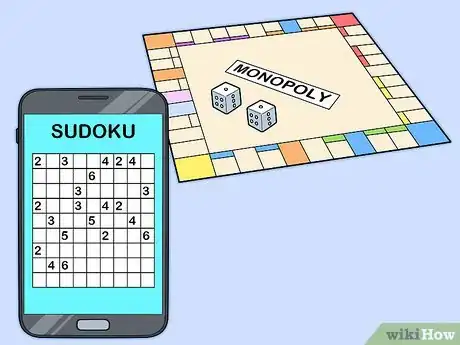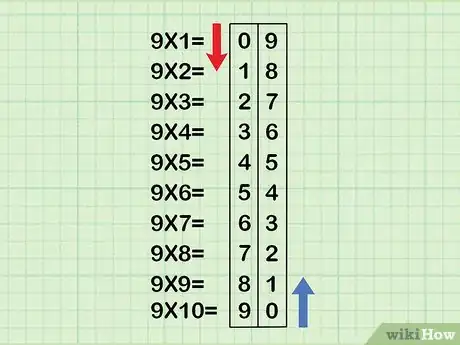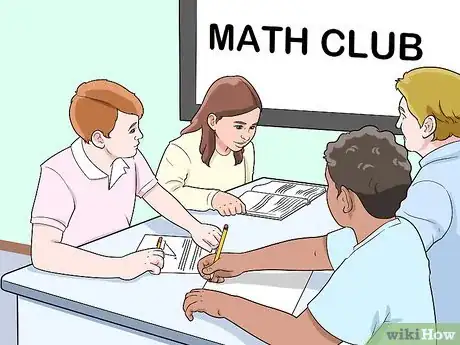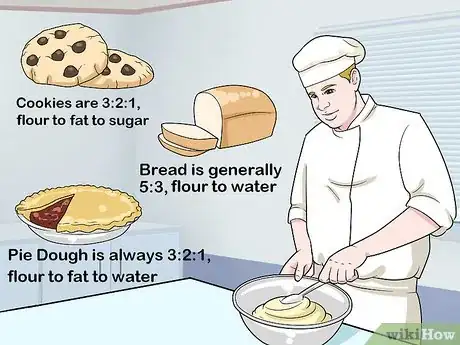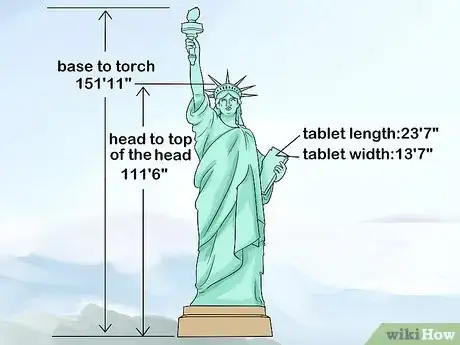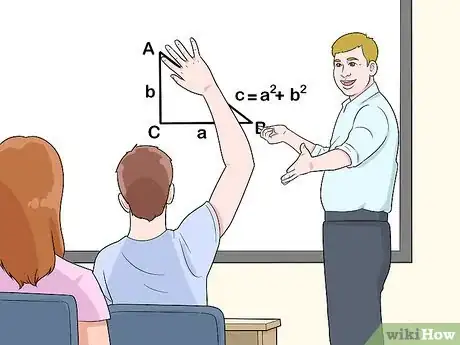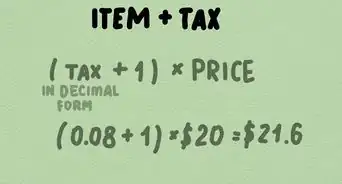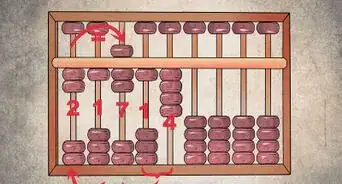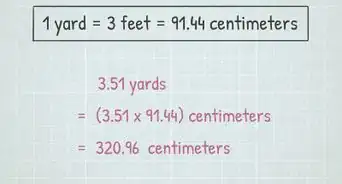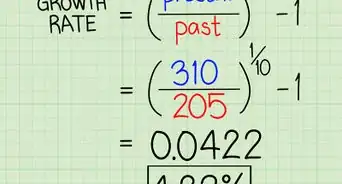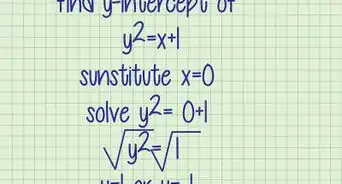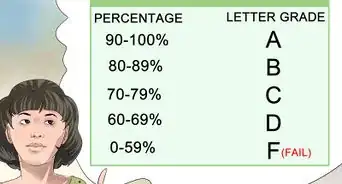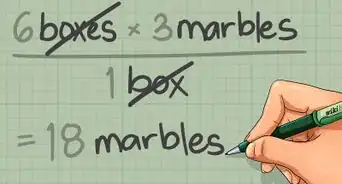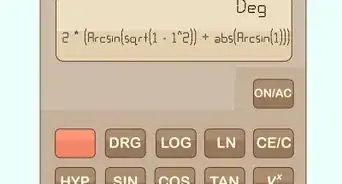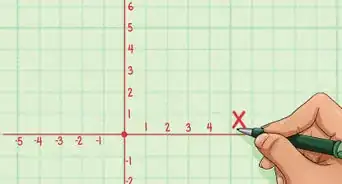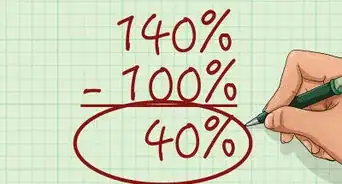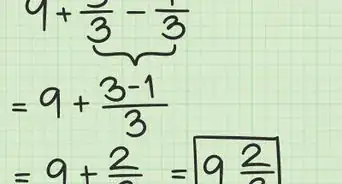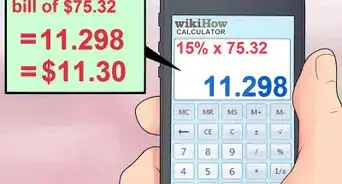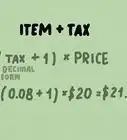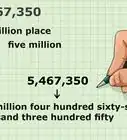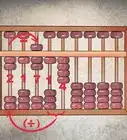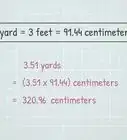This article was co-authored by Daron Cam. Daron Cam is an Academic Tutor and the Founder of Bay Area Tutors, Inc., a San Francisco Bay Area-based tutoring service that provides tutoring in mathematics, science, and overall academic confidence building. Daron has over eight years of teaching math in classrooms and over nine years of one-on-one tutoring experience. He teaches all levels of math including calculus, pre-algebra, algebra I, geometry, and SAT/ACT math prep. Daron holds a BA from the University of California, Berkeley and a math teaching credential from St. Mary's College.
There are 9 references cited in this article, which can be found at the bottom of the page.
This article has been viewed 56,417 times.
While sitting in math class listening to your teacher multiply and add endless amounts of numbers, math can become tedious and uninteresting pretty quickly. However, you can remedy the monotony of math by making math meaningful to you. Make math meaningful by exploring how math permeates every aspect of life, even your interests!
Steps
Cultivating Your Interest in Math
-
1Make math a game.[1] Make math more interesting by turning it into a game. Download an app on your computer or tablet that uses math to solve puzzles or complete different levels in the game. You can also play old-fashion board games, like Monopoly or Yahtzee, to exercise your math skills while still having fun.[2]
- Dice and Card games are also great ways to develop and test your math skills.
-
2Learn math tricks. There are a lot of tricks in math that are fun to know because they save you a lot of time. They are often interesting, too. For example, adding up all the numbers from 1 to 100 is a lot of work. But, check out this very easy way to do it: 100 + 1 = 101 and 99 + 2 = 101, right? So does 98 + 3, 97 + 4, 96 + 5, etc. Instead, if you multiply 101 by the amount of these pairs, you will get your sum of all the numbers from 1 to 100, which is 5050. You could have added 1+2+3...but by doing this, you found a way out of doing extra work. That's fun.
- Learn math tricks that will make calculating much easier.
Advertisement -
3Join a math club. Math clubs will be filled with people who are passionate about math. By surrounding yourself with math lovers, it will inspire you to become interested in math, and to learn about the different ways in which math is incorporated in your everyday life. Join a club at school, online, or in your local community.
-
4Make math easy. A lot of people lose interest in math because it can be difficult to learn. Math can be difficult to learn because, in the modern-day classroom, students are taught to learn math by memorizing formulas. However, by learning math this way, students aren't taught the underlying principles and concepts, which are needed to understand why a particular formula is being used. Therefore, make math easier by learning and understanding the underlying principles and concepts of a given piece of mathematics.[3]
- Ask your teacher during or after class why and how a particular formula works, while others do not. Ask your teacher, "What are the underlying principles of this formula?" or "How can I make this formula less abstract and more concrete?"
- You can test yourself to see if you understand math by asking yourself these questions:[4]
- Can I explain mathematical facts and concepts in simpler facts and concepts?
- Can I make logical connections between different concepts and facts?
- Can I identify the principles that make everything work in a given piece of mathematics?
-
5Solve challenging problems. Many people are bored in math class because the curriculum is using repetitive teaching methods encouraging rote memorization. If that's the case, try doing math competition problems, like AMC and MATHCOUNTS. Another choice is to read further in math textbooks and try to understand, not just memorize.
Maintaining Your Interest in Math
-
1Connect math and reading. Read books centered on mathematical mysteries or fictional and/or autobiographical books based on famous mathematicians. For example, a lot of Paul Verhoeven’s books incorporate math.[5] Also, The Number Devil by Hans Magnus Enzensberger is a popular fiction book about math.
-
2Bake something. Baking uses a lot of proportions and ratios. By baking your favorite cake, brownies, or cookies, you can learn about proportions and ratios while having fun and satisfying your taste buds.
-
3Connect math with your interests. You can promote your interest in math by exploring how math is related to something you love! For example, if you’re interested in historical landmarks, like the Golden Gate Bridge or the Statue of Liberty, learn about the math that was involved in building these landmarks.[8]
- If you’re interested in a subject not traditionally associated with math, learn how that subject incorporates math. For example, if you are interested in fashion, explore how cutting patterns and sewing these patterns together involves math.[9]
-
4Connect math to everyday life. New math formulas can seem mundane and uninteresting, especially if you do not apply them to anything. Make math interesting by applying mundane formulas to everyday life circumstances. For example, if you have an alarm clock, chances are you are calculating how many extra minutes you can sleep before you get out of bed once you hit the snooze button. Try to notice the different ways you do math in your day-to-day tasks.[10]
-
5Be positive about math. Realize that, if you keep an open mind, you can learn anything. Yes, math can be hard at times, but perhaps there is a better way for you to learn math, like playing games with friends or reading a fictional story based on a mathematical mystery.
Staying Focused in Math Class
-
1Be prepared for math class. By being prepared for math class, you will be able to keep up with the new material being taught by your teacher. You will feel engaged, less distracted, and more interested. Be prepared for math class by completing your homework on time, by getting help beforehand if you do not understand a problem, and by having all your materials ready for class to begin, i.e., pencil, paper, textbook, and calculator.
-
2Sit up front. If you find it hard staying focused in math class, try sitting in front of the class, for example, the first or second row. By sitting in the front of the classroom, you will be able to hear everything your teacher is saying. By sitting up front, your teacher will also make eye contact with you, and there are fewer distractions in the front of the classroom.[11]
-
3Participate in class. Make math class interesting by participating! This means asking questions when you do not understand something.[12] If you do not understand a math problem, ask your teacher about a real life example. You can also volunteer to work out the math problem on the board, or engage in a friendly competition with a classmate to see who can solve the equation first.
-
4Take notes. By taking notes during class, you will be more engaged with the material. You can take notes by drawing pictures or diagrams to help you understand a concept. You can also write down words you have not heard before and their definitions.
- Many mathematical words have their origins in Greek, Latin, or Arabic. Try tracing the root of these words to combine math with history.
Expert Q&A
-
QuestionHow do I get my child interested in math?
 Daron CamDaron Cam is an Academic Tutor and the Founder of Bay Area Tutors, Inc., a San Francisco Bay Area-based tutoring service that provides tutoring in mathematics, science, and overall academic confidence building. Daron has over eight years of teaching math in classrooms and over nine years of one-on-one tutoring experience. He teaches all levels of math including calculus, pre-algebra, algebra I, geometry, and SAT/ACT math prep. Daron holds a BA from the University of California, Berkeley and a math teaching credential from St. Mary's College.
Daron CamDaron Cam is an Academic Tutor and the Founder of Bay Area Tutors, Inc., a San Francisco Bay Area-based tutoring service that provides tutoring in mathematics, science, and overall academic confidence building. Daron has over eight years of teaching math in classrooms and over nine years of one-on-one tutoring experience. He teaches all levels of math including calculus, pre-algebra, algebra I, geometry, and SAT/ACT math prep. Daron holds a BA from the University of California, Berkeley and a math teaching credential from St. Mary's College.
Academic Tutor There are tons of fun math apps and games available online. I recommend trying out Math Jumps and Math Workout.
There are tons of fun math apps and games available online. I recommend trying out Math Jumps and Math Workout. -
QuestionMy family is really good at math, but I'm horrible at it! I participate in class but when I do the homework and tests I fail them. What can I do?
 Community AnswerAsk questions and keep trying. If you don't know what you did wrong on a specific problem, ask a teacher. Most textbooks have a homework help website. Kahn Academy is a great resource. If you are taking calculus, then CalcChat.com is a lifesaver. Also, ask your family for help with your homework.
Community AnswerAsk questions and keep trying. If you don't know what you did wrong on a specific problem, ask a teacher. Most textbooks have a homework help website. Kahn Academy is a great resource. If you are taking calculus, then CalcChat.com is a lifesaver. Also, ask your family for help with your homework. -
QuestionI'm good at math, but the problem is in exams I fail math because of silly mistakes (I make many) because math somehow gives my mind a lot of pressure. How should I avoid my silly mistakes?
 DonaganTop AnswererCheck and re-check your answers.
DonaganTop AnswererCheck and re-check your answers.
References
- ↑ Daron Cam. Academic Tutor. Expert Interview. 29 May 2020.
- ↑ https://www.oxfordlearning.com/make-math-more-fun/
- ↑ http://www.slate.com/blogs/quora/2014/03/11/stem_what_barriers_block_people_from_studying_math_or_science_in_college.html
- ↑ http://www.math.utah.edu/~pa/math.html
- ↑ http://www.math.unl.edu/~bharbourne1/MathInTheMovies.html
- ↑ http://www.leapfrog.com/en-us/learning-path/articles/article-tipping-the-scales-cultivating-your-daughters-interest-in-math-and-science
- ↑ http://www.smithsonianmag.com/science-nature/five-historic-female-mathematicians-you-should-know-100731927/?no-ist
- ↑ http://www.edutopia.org/blog/9-strategies-motivating-students-mathematics-alfred-posamentier
- ↑ http://www.leapfrog.com/en-us/learning-path/articles/article-tipping-the-scales-cultivating-your-daughters-interest-in-math-and-science
- ↑ http://oureverydaylife.com/use-mathematics-everyday-life-14225.html
- ↑ Daron Cam. Academic Tutor. Expert Interview. 29 May 2020.
- ↑ Daron Cam. Academic Tutor. Expert Interview. 29 May 2020.
